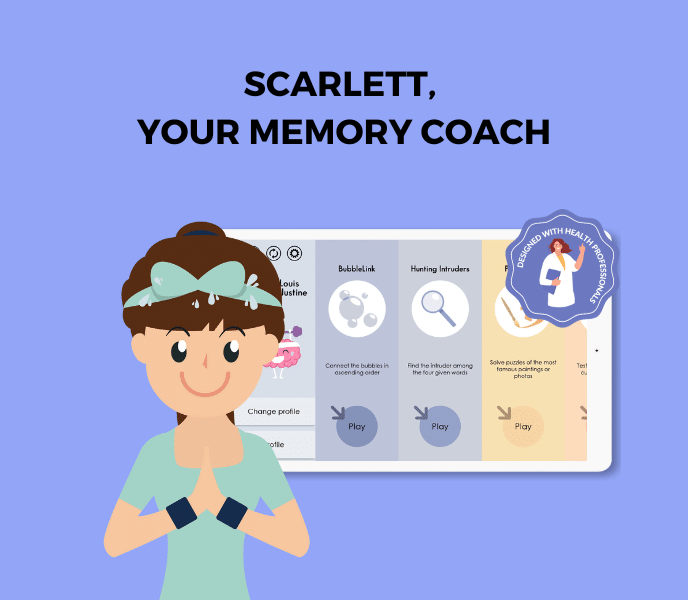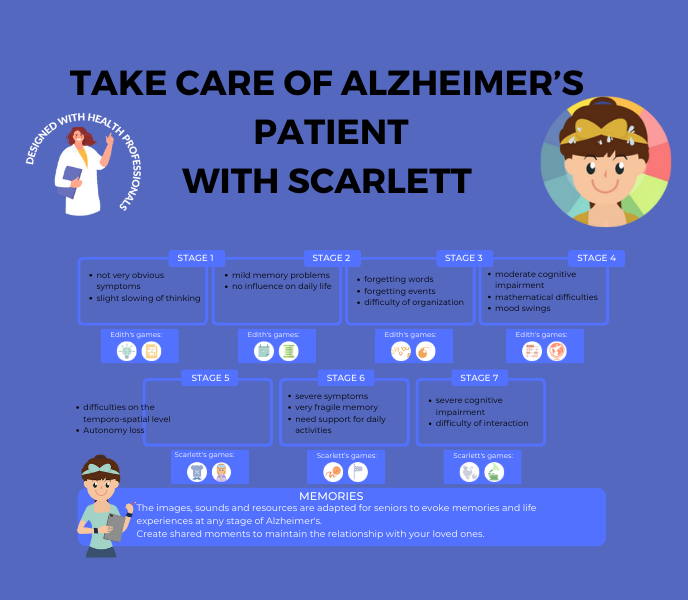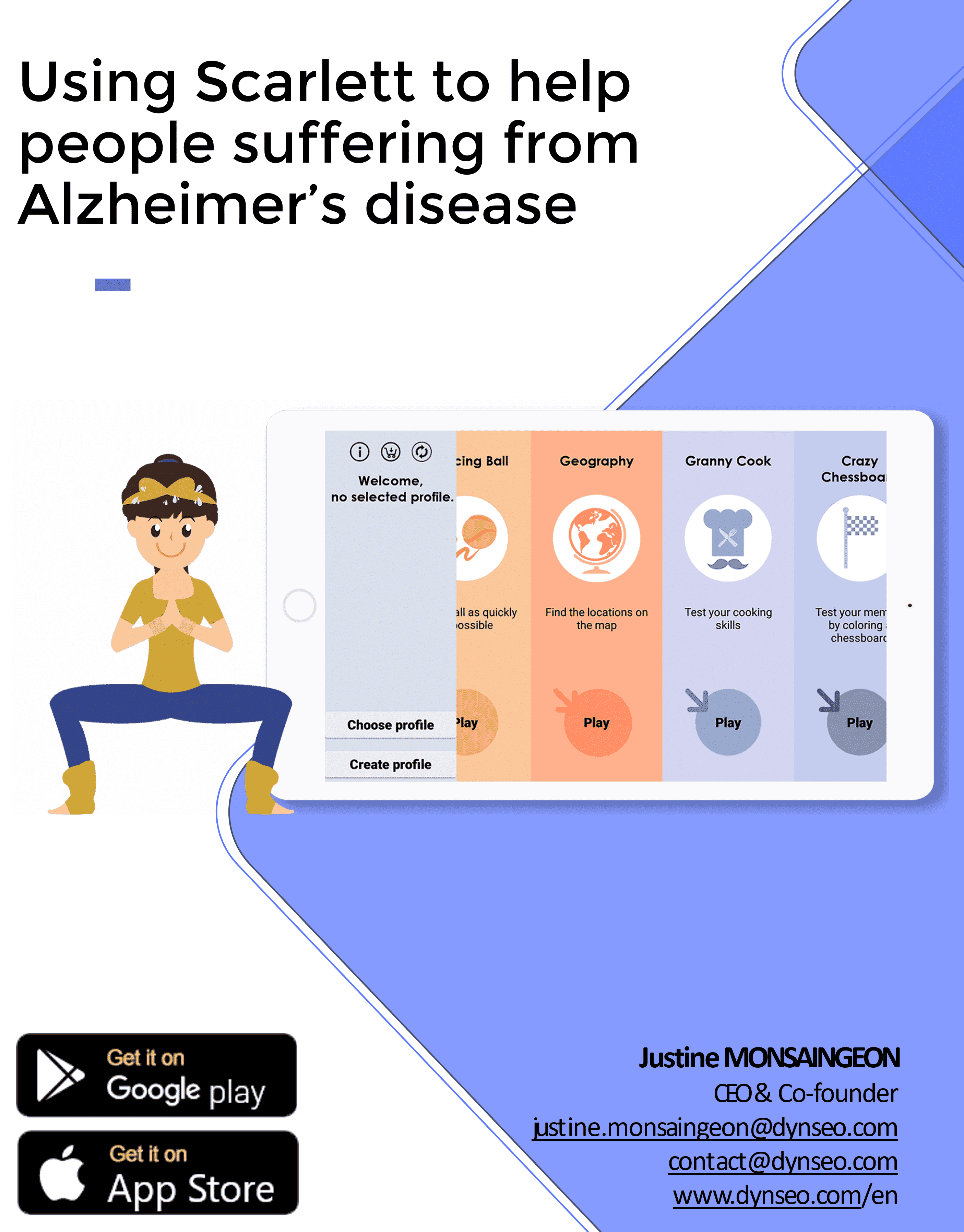In the realm of Alzheimer’s care, collaborative efforts between caregivers and families play a pivotal role in ensuring the well-being and quality of life of affected individuals. The journey of caring for someone with Alzheimer’s Disease is multifaceted and challenging, requiring a coordinated approach that draws upon the strengths and resources of both caregivers and family members. Amidst this landscape, the role of games emerges as a compelling tool for enhancing the cognitive, emotional, and social well-being of Alzheimer’s patients. Games offer a unique avenue for engagement and stimulation, providing opportunities for meaningful interactions, cognitive stimulation, and emotional connection.
By fostering collaboration between caregivers and families around the incorporation of games into caregiving routines, individuals with Alzheimer’s can experience enhanced quality of life and improved overall functioning. This introduction sets the stage for exploring the synergistic relationship between collaborative caregiving efforts and the therapeutic potential of games in Alzheimer’s care.
Understanding Alzheimer’s Disease
Alzheimer’s Disease, a progressive neurodegenerative disorder, is characterized by the accumulation of amyloid plaques and neurofibrillary tangles in the brain, leading to cognitive decline and memory impairment. It poses significant challenges not only to affected individuals but also to their families, as they navigate the emotional, financial, and practical implications of providing care and support.
The profound impact of Alzheimer’s extends beyond the individual, affecting the entire family dynamic and social network. In response to these complexities, holistic care approaches have emerged as essential strategies for addressing the diverse needs of individuals living with Alzheimer’s and their families. Holistic care emphasizes a comprehensive approach that considers not only the physical symptoms but also the emotional, social, and spiritual well-being of the individual, fostering a supportive environment conducive to optimal quality of life for both patients and their caregivers.
Importance of Collaboration
Collaboration between caregivers and families is integral to the comprehensive care of individuals with Alzheimer’s Disease, yielding numerous benefits for both patients and caregivers alike. By pooling resources, knowledge, and support, collaboration fosters a unified approach to caregiving that ensures consistency, continuity, and quality of care. Through effective teamwork, caregivers and families can tailor care plans to meet the specific needs and preferences of the individual, promoting patient-centered care that prioritizes dignity, autonomy, and well-being.
However, despite its importance, collaboration can face challenges and barriers, including communication breakdowns, differing perspectives on care decisions, and logistical constraints. Overcoming these obstacles requires open communication, mutual respect, and a shared commitment to the well-being of the individual, underscoring the importance of fostering a collaborative partnership between caregivers and families in Alzheimer’s care.
Selection of Games
Selecting appropriate games for individuals with Alzheimer’s Disease involves careful consideration of their cognitive abilities, interests, and preferences. Caregivers and healthcare professionals should prioritize games that offer cognitive stimulation, promote social interaction, and are easy to understand and navigate. Additionally, the selection process should take into account the stage of Alzheimer’s Disease, with simpler and more familiar games being preferable in the early stages, while games with reduced complexity and sensory overload may be more suitable in later stages.
Importantly, involving the patient in the game selection process empowers them to maintain a sense of autonomy and dignity, allowing them to express their preferences and participate actively in their care. By engaging the individual in the selection of games tailored to their needs and abilities, caregivers can enhance their overall well-being and quality of life.
Strategies for Effective Collaboration
Effective collaboration between caregivers and families in Alzheimer’s care relies on several key strategies aimed at fostering teamwork and mutual understanding. Firstly, open communication serves as the foundation for successful collaboration, enabling caregivers and families to share information, concerns, and insights regarding the care of their loved one. Establishing shared goals and expectations further solidifies collaboration by aligning efforts towards a common purpose, such as enhancing the quality of life for the individual with Alzheimer’s.
Additionally, flexibility and willingness to adapt approaches are essential, as the needs and preferences of the individual may evolve over time. By remaining open-minded and responsive to changing circumstances, caregivers and families can navigate challenges and work together to provide the best possible care and support for their loved one with Alzheimer’s Disease.
Integration of Games into Care Plans
Incorporating games into care plans for individuals with Alzheimer’s Disease is a proactive approach to enhancing overall well-being and cognitive function. By integrating adapted dementia games into care plans, caregivers can introduce structured activities that provide mental stimulation, social engagement, and enjoyment for the individual. This integration ensures that games become an integral part of the daily routine, contributing to a holistic approach to care that addresses the cognitive, emotional, and social needs of the individual.
Incorporating games into daily routines
Embedding games into daily routines offers numerous benefits for individuals with Alzheimer’s Disease. By weaving game activities into regular schedules, caregivers can create predictable and engaging experiences that promote cognitive stimulation and routine maintenance. Simple games like card matching or word puzzles can be incorporated into morning or evening routines, providing opportunities for mental engagement and social interaction. Additionally, incorporating games into daily routines helps establish a sense of structure and familiarity, which can be comforting for individuals with Alzheimer’s amidst the challenges of memory loss and cognitive decline.
Tailoring game activities to individual preferences and abilities
Customizing game activities for individuals with Alzheimer’s Disease isn’t just about keeping them busy; it’s about connecting with them on a personal level and enriching their lives. Here’s how you can do it:
- Know Their Story: Start with what they love. Was the person an avid gardener, a music lover, or a chess enthusiast? Pick activities that echo these interests. It’s like saying, “I remember who you are.”
- Watch and Learn: Pay close attention to how they react to different games. Do they light up when they see pictures of flowers or when they solve a puzzle? Their reactions are your guide to finding what works best.
- Keep It Flexible:
- If they’re having a good day, maybe try something a bit challenging to keep their mind sharp. On tougher days, switch to simpler, more soothing activities. It’s all about adapting to their needs.
- Celebrate Every Win: Choose games where they can succeed. It’s not about the complexity but the joy and the sense of achievement they feel. A simple game of matching cards can be a big win.
- Mix It Up: Variety is the spice of life. Rotate between different types of games — memory games, physical games like balloon toss, or creative ones like painting. It keeps things fresh and engaging.
- Create Connection Opportunities: Games should also be about bringing people together. Whether it’s a group game that encourages teamwork or a two-player game with a caregiver, it’s about sharing moments of joy and laughter.
- Adjust As You Go: Everyone’s journey with Alzheimer’s is unique. A game that’s a hit today might not be tomorrow. Be ready to adapt and explore new activities as their interests and abilities evolve.
Monitoring progress and making adjustments
Regular monitoring of progress and making necessary adjustments are crucial aspects of integrating games into care plans for individuals with Alzheimer’s Disease. Caregivers should observe the individual’s responses to game activities, noting changes in cognitive function, mood, and engagement levels. Based on these observations, adjustments can be made to game selection, difficulty level, or duration to optimize the experience for the individual. Additionally, caregivers should remain flexible and responsive to the changing needs and preferences of the individual over time, ensuring that game activities continue to align with their evolving capabilities and interests. By monitoring progress and making proactive adjustments, caregivers can facilitate meaningful and beneficial game experiences for individuals with Alzheimer’s Disease.
Training and Support for Caregivers
Training and support for caregivers are essential components of effective Alzheimer’s care, particularly concerning the integration of games into caregiving routines. Providing resources and guidance on using games effectively equips caregivers with the necessary knowledge and tools to implement game-based interventions successfully. Training caregivers on game facilitation techniques further enhances their competence in engaging individuals with Alzheimer’s Disease in meaningful game activities.
Additionally, offering emotional support and encouragement acknowledges the challenges caregivers face and provides them with the necessary support to navigate the emotional aspects of caregiving. By combining practical guidance with emotional support, caregivers can feel empowered and equipped to provide holistic care that prioritizes the well-being of individuals with Alzheimer’s Disease and supports their own well-being in the caregiving journey.
Engaging Families in Game Activities
Engaging families in-game activities holds immense potential for fostering meaningful connections and enhancing the overall well-being of individuals with Alzheimer’s Disease. By actively encouraging family participation in game sessions, caregivers can create an inclusive and supportive environment where everyone feels valued and involved. Through shared experiences and bonding opportunities facilitated by game activities, families can strengthen their relationships and create lasting memories together.
Moreover, promoting understanding and empathy among family members through collaborative gameplay allows for greater insight into the challenges faced by individuals with Alzheimer’s and fosters a sense of compassion and support within the family unit. By actively engaging families in-game activities, caregivers can enrich the caregiving experience, promote family cohesion, and ultimately improve the quality of life for individuals with Alzheimer’s Disease.
Monitoring and Evaluation
Monitoring and evaluation play crucial roles in ensuring the effectiveness of game-based interventions in Alzheimer’s care. Firstly, assessing the impact of games on patient well-being involves tracking changes in cognitive function, mood, and social engagement over time. By employing standardized assessment tools and observing behavioral indicators, caregivers can gauge the efficacy of game activities in promoting patient well-being. Additionally, soliciting feedback from caregivers and families provides valuable insights into the perceived benefits and challenges of game-based interventions.
This feedback allows caregivers to make informed decisions about the selection and implementation of game activities, ensuring alignment with the needs and preferences of individuals with Alzheimer’s Disease. Moreover, adjusting strategies based on observations and outcomes enables caregivers to optimize the effectiveness of game interventions, making necessary adaptations to enhance engagement and maximize therapeutic benefits for patients. Through systematic monitoring and evaluation processes, caregivers can continuously improve the quality and impact of game-based interventions in Alzheimer’s care.
Overcoming Challenges and Addressing Concerns
Overcoming challenges and addressing concerns in Alzheimer’s care often involves navigating resistance or skepticism from family members regarding game-based interventions. Caregivers can address this by transparently communicating the rationale behind incorporating games into the care plan, emphasizing their potential benefits for the individual’s cognitive, emotional, and social well-being. When disagreements or conflicts arise regarding approaches to care, open dialogue and active listening can help identify common goals and find mutually acceptable solutions.
Additionally, caregivers may encounter situations where professional assistance is necessary, such as when managing complex behavioral issues or adjusting care strategies. Seeking support from healthcare professionals, such as dementia specialists or social workers, can provide valuable guidance and resources to address challenges effectively, ensuring that the needs of individuals with Alzheimer’s Disease and their families are met with compassion and expertise.
Celebrating Successes and Milestones
Celebrating successes and milestones in Alzheimer’s care is vital for acknowledging achievements and fostering a positive and supportive environment for both individuals with Alzheimer’s Disease and their caregivers. By acknowledging achievements and improvements, caregivers can recognize the progress made by individuals with Alzheimer’s, no matter how small, and reinforce their sense of accomplishment and self-worth.
Fostering a positive and supportive environment further cultivates a sense of optimism and resilience, encouraging individuals to continue striving towards their goals. Additionally, sharing success stories within the caregiving community serves to inspire others, offering hope and encouragement in the face of challenges. By celebrating successes and milestones, caregivers not only uplift the spirits of those affected by Alzheimer’s but also create a sense of camaraderie and shared purpose that strengthens the caregiving journey.
Collaboration between caregivers and families is paramount in Alzheimer’s care, serving as a cornerstone for holistic support and enhanced quality of life for individuals with the disease. Throughout this discussion, we’ve underscored the significance of teamwork in integrating game-based interventions into caregiving routines, addressing challenges, and celebrating successes. As we move forward, it’s crucial to foster partnerships between caregivers and families, recognizing their shared responsibility in providing compassionate and effective care.
By embracing collaborative game support, we envision a future where individuals with Alzheimer’s Disease experience improved cognitive function, social engagement, and overall well-being. Through continued collaboration and dedication, we can create a more supportive and empowering environment for Alzheimer’s patients and their families, enhancing their journey and enriching their lives.
Helpful Resources for Individuals with Alzheimer’s
Finding the right resources can make a significant difference in the journey of those affected by Alzheimer’s. Here are some key resources that can provide support, information, and assistance:
- Alzheimer’s Association: A leading voluntary health organization in Alzheimer’s care, support, and research. They offer a wealth of information, local support groups, and a 24/7 helpline.
- The National Institute on Aging (NIA): Part of the U.S. National Institutes of Health, NIA offers comprehensive information on Alzheimer’s disease, including the latest research and tips for caregivers.
- Alzheimer’s Foundation of America (AFA): Provides support, services, and education to individuals, families, and caregivers affected by Alzheimer’s disease and related dementias nationwide.
- Memory Cafés: These are safe and comfortable spaces where individuals with Alzheimer’s and their caregivers can socialize, listen to music, play games, and enjoy other activities. It’s a great way to meet others who are on a similar journey.
- Local Support Groups: Joining a support group can provide a sense of community and a valuable space to share experiences and coping strategies. Many communities offer groups specifically for Alzheimer’s caregivers and families.
- Caregiver Resources: Look for organizations that offer resources and respite care options for caregivers. This can include educational materials, workshops, and counseling services to support caregiver well-being.
- Online Forums and Communities: Platforms like the Alzheimer’s Association’s ALZConnected offer a place for caregivers and individuals with Alzheimer’s to ask questions, share stories, and connect with others who understand their experience.
- Educational Workshops and Webinars: Many organizations offer free educational programs that cover a wide range of topics related to Alzheimer’s and dementia care. These can be great opportunities to learn from experts and ask questions.
- Safe Return Programs: Consider enrolling in a safe return program designed to help locate individuals who wander and become lost. These programs can provide peace of mind to families and caregivers.
AND FOR FURTHER INFORMATION

SCARLETT, YOUR MEMORY COACH FOR ALZHEIMER’S
The SCARLETT play program has been specially designed with healthcare professionals for use with Alzheimer’s patients. Non-checking games adapted to their level and prior knowledge. The aim is to focus on the pleasure of playing.
Other articles that might interest you:
The Role of Cognitive Apps in Speech Therapy for Alzheimer’s Patients
Alzheimer’s disease is a progressive neurological disorder that primarily affects memory, thinking, and behavior. As...
Memory Apps for Alzheimer’s: Enhancing Recall in Speech Therapy Sessions
Alzheimer's disease is a progressive neurological disorder that primarily affects memory, thinking, and behavior. As...
Cognitive Rehabilitation Apps for Speech Therapy with Alzheimer’s Patients
In recent years, the landscape of cognitive rehabilitation has evolved significantly, largely due to the advent of...







